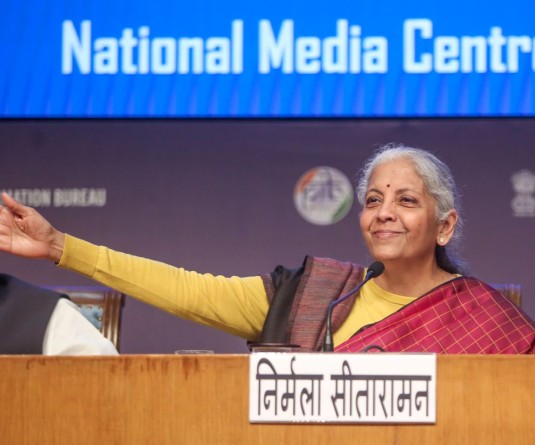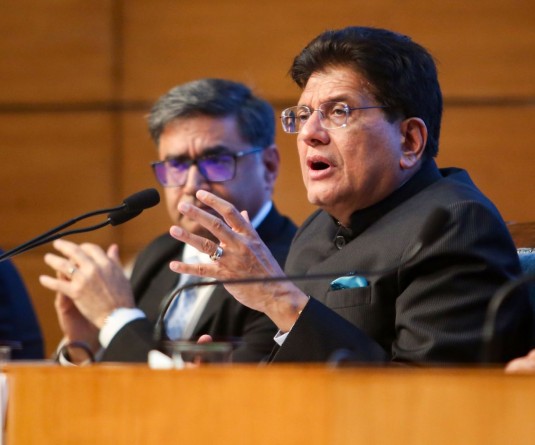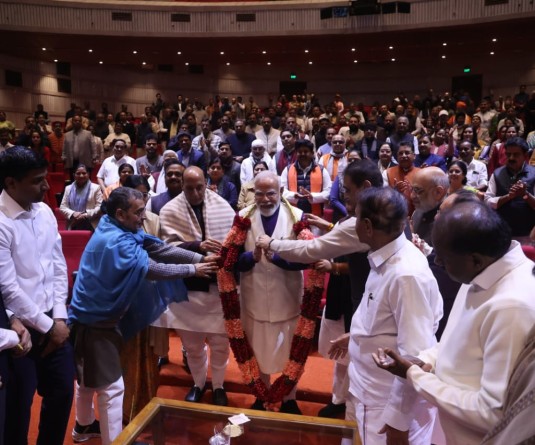Washington: Prime Minister Narendra Modi with USA President Joe Biden and First Lady Jill Biden at the White House , in Washington, Thursday, June 22, 2023. (Photo:IANS/PIB)

Washington, June 23 (IANS): Prime Minister Narendra Modi has sought to allay concerns in the US Congress about India's position on the Russian invasion of Ukraine by reiterating his public and direct message to Russian President Vladimir Putin: that "this is not an era of war" but of dialogue and diplomacy.
The standing ovation that followed showed members of the Congress had wanted to hear that assurance from the Prime Minister as many among them, including stanch and steady friends of the bilateral relationship had expressed concern with India's refusal to condemn Russia and said the time had come for India to choose which side it wanted to be on.
Modi also spoke at length about India's commitment to democracy, which was another issue of concern for the lawmaker, more than 70 of whom wrote a joint letter to US President Joe Biden this week urging him to raise issues of democracy, religious and press freedom in India.
The Prime Minister also, however, proceeded to bunch the rule of the Delhi Sultanate and the Mughals with that of the British empire, calling them together as "thousand years of foreign rule", in the context of the 75th anniversary of Indian independence in 2022.
Modi became today the first Indian Prime Minister to address a joint session of the US Congress twice, calling it an "exceptional privilege".
He spoke in English, reading from a teleprompter, to repeated applause from the floor and the packed visitors gallery, which frequently cheered him by chanting "Modi, Modi" and, finally, "Vande Mataram" and "Bharat Mata Ki Jai".
Modi described the Russian invasion of Ukraine one of "deeply disruptive developments" in recent years when "war returned to Europe". He said the Global South was deeply affected.
"The global order is based on the respect for the principles of the UN Charter, peaceful resolution of disputes and respect for sovereignty and territorial integrity," the Prime Minister said to loud applause from the lawmakers.
"As I have said directly, and publicly. This is not an era of war," Modi went on to say, to even louder and longer applause, with whoops, adding, "But it is one of dialogue and diplomacy. And we all must do what we can to stop the bloodshed and human suffering."
Modi was referring to his remarks in Samarkand, Uzbekistan, at a joint media availability with Russian President Vladimir Putin.
With a bank of TV cameras trained on the two leaders, Modi had told Putin that "this was not an era of war". The comment reverberated around world capitals and probably the loudest in here in Washington D.C.
This US Congress has approved billions of dollars of defence supplies requisitioned by the Biden administration for Ukraine and though some lawmakers have begun to question these expenses, the body as a whole remains deeply committed to helping Ukraine for, as Biden has said, "as long as it takes".
The Prime Minister also sought to address another concern many lawmakers have had, publicly and privately, about, what they see as a backslide of democracy in India, with targeting of religious minorities, crackdown on dissent and press freedom.
Congresswoman Pramila Jayapal and Senator Chris Van Hollen led a joint letter signed by more than 70 members of Congress urging Biden to raise these issues in his conversations with Modi.
Democratic Senator Mark Warner, who is a co-chair of the India Caucus, had also said he would like to see the Prime Minister to express "commitment, recommitment" to democracy.
"Democracy is one of sacred and shared values," Modi said and went on to add, "Democracy is the spirit that supports equality and dignity; democracy is the idea that welcomes debate and discourse; democracy is a culture that gives wings to thoughts and expression."
India is blessed to have such values from times immemorial. "In evolution of the democratic spirit," he said, "India is the mother of democracy."
The Prime Minister read a Sanskrit phrase in support of his contention, which, he said, meant "truth is one but the wise express it in a different ways".






